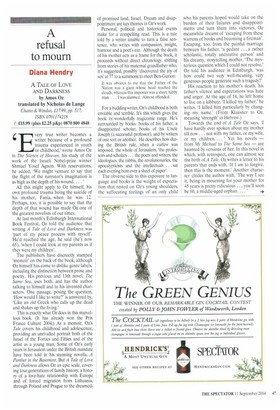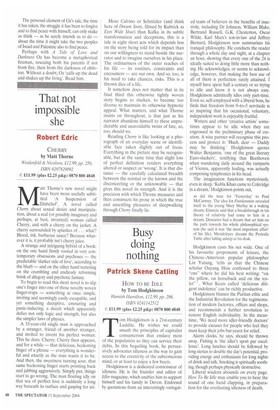A refusal to mourn
Diana Hendry
A TALE OF LOVE AND DARKNESS by Amos Oz translated by Nicholas de Lange Chatto & Windus, £17.99, pp. 517, ISBN 0701174218 rt £15.99 (plus £2.25 p&p) 0870 800 4848
‘ ve7 true writer becomes a writer because of a profound writer because of a profound trauma experienced in youth
or childhood,' wrote Amos Oz in The Silence of Heaven, his study of the work of the Israeli Nobel-prize winner Shmuel Yosef Agnon. With reservations, he added, 'We might venture to say that the flight of the narrator's imagination is as high as the depth of his wound. .
All this might apply to Oz himself, his own profound trauma being the suicide of his mother, Fania, when he was 12. Perhaps, too, it is possible to say that the depth of that wound has made Oz one of the greatest novelists of our times.
At last month's Edinburgh International Book Festival, Oz told the audience that writing A Tale of Love and Darkness was 'part of my peace process with myself. He'd reached the age, he said (he's now 65), 'when I could look at my parents as if they were my children'. The publishers have discreetly stamped 'memoir' on the back of the book, although Oz himself has come to dislike genre labels, including the distinction between prose and poetry. His previous and 13th novel, The Same Sea, uses both, and has the author talking to himself and to his invented characters. One passage, posing the question, 'How would I like to write?' is answered by, 'Like an old Greek who calls up the dead and shakes up the living.' This is exactly what Oz does in this marvellous book. (It has already won the Prix France Culture 2004.) As a memoir, Oz's Tale covers his childhood and adolescence, providing an unrivalled portrait both of the Israel of the Forties and Fifties and of the artist as a young man. Some of Oz's early years in Jerusalem under the British mandate have been told in his stunning novella, A Panther in the Basement. But A Tale of Love and Darkness allows Oz an epic scale, covering four generations of family history, a history of a love-hate relationship with Europe and of forced migration from Lithuania, through Poland and Prague to the dreamed
of promised land, Israel. Dream and disappointment are key themes in Oz's work. Personal, political and historical events make for a compelling read. This is a tale told by a writer unable to turn a false sentence, who writes with compassion, insight, humour and a poet's ear. Although the death of his mother acts as a frame for the book, it proceeds without direct chronology, shifting from stories of his maternal grandfather who, it's suggested, possibly 'discovered the joy of sex' at 77 to a summons to meet Ben-Gurion:
It was obvious to me that the Father of the Nation was a giant whose head reached the clouds, whereas this imposter was a short, tubby man. . . . I was alarmed. Almost offended.
For a budding writer, Oz's childhood is both enviable and terrible. It's this which gives the book its wonderfully tragicomic range. He's surrounded by books: books of his father, a disappointed scholar, books of his Uncle Joseph (a successful professor), and by writers of one sort or another. He describes how during the British rule, when a curfew was imposed, the whole of Jerusalem, 'the professors and scholars . the poets and writers, the ideologues, the rabbis, the revolutionaries, the apocalypticists and the intellectuals .. . sat each evening bent over a sheet of paper'. The obverse side to this exposure to language and books is the weight of expectation that rested on Oz's young shoulders, the suffocating feelings of an only child who his parents hoped would take on the burden of their failures and disappointments and turn them into victories. Oz meanwhile dreamt of 'escaping from these warrens of books and becoming a fireman'. Escaping, too, from the painful marriage between his father, 'a pedant . . . a rather scholastic, totally uncreative person' and his dreamy, storytelling mother. 'The mysterious question which I could not resolve,' Oz told his audience in Edinburgh, 'was how could two very well-meaning, very generous people generate such a tragedy?' His reaction to his mother's death, his father's silence and expectations was hate and anger. At the age of 14, he left home to live on a kibbutz. 'I killed my father,' he writes, 'I killed him particularly by changing my name.' (From Klausner to Oz, meaning 'strength' in Hebrew.)
Towards the end of A Tale Oz says, 'I have hardly ever spoken about my mother till now. . . not with my father, or my wife, or my children. . . . ' Yet his novels — from My Michael to The Same Sea — are haunted by versions of her. In this novel in which, with retrospect, one can almost see the birth of A Tale, Oz writes a letter to his parents that ends with, 'If I am to forgive, then this is the moment.' Another character chides the author with, 'The way I see it, being in mourning for your mother for 45 years is pretty ridiculous . . . you'll soon be 60, a middle-aged orphan. . . '
The personal element of Oz's tale, the time it has taken, the struggle it has been to forgive and to find peace with himself, can only make us think — as he surely intends us to do — about the time it might take the two peoples of Israel and Palestine also to find peace.
Perhaps with A Tale of Love and Darkness Oz has become a metaphorical fireman, rescuing both his parents if not from fire, then from the darkness of oblivion. Without a doubt, Oz 'calls up the dead and shakes up the living'. Read him.











































































 Previous page
Previous page